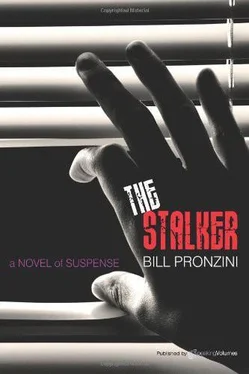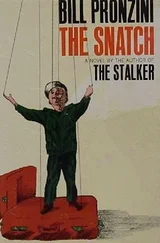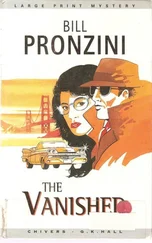Bill Pronzini - The Stalker
Здесь есть возможность читать онлайн «Bill Pronzini - The Stalker» весь текст электронной книги совершенно бесплатно (целиком полную версию без сокращений). В некоторых случаях можно слушать аудио, скачать через торрент в формате fb2 и присутствует краткое содержание. Жанр: Старинная литература, на английском языке. Описание произведения, (предисловие) а так же отзывы посетителей доступны на портале библиотеки ЛибКат.
- Название:The Stalker
- Автор:
- Жанр:
- Год:неизвестен
- ISBN:нет данных
- Рейтинг книги:4 / 5. Голосов: 1
-
Избранное:Добавить в избранное
- Отзывы:
-
Ваша оценка:
- 80
- 1
- 2
- 3
- 4
- 5
The Stalker: краткое содержание, описание и аннотация
Предлагаем к чтению аннотацию, описание, краткое содержание или предисловие (зависит от того, что написал сам автор книги «The Stalker»). Если вы не нашли необходимую информацию о книге — напишите в комментариях, мы постараемся отыскать её.
The Stalker — читать онлайн бесплатно полную книгу (весь текст) целиком
Ниже представлен текст книги, разбитый по страницам. Система сохранения места последней прочитанной страницы, позволяет с удобством читать онлайн бесплатно книгу «The Stalker», без необходимости каждый раз заново искать на чём Вы остановились. Поставьте закладку, и сможете в любой момент перейти на страницу, на которой закончили чтение.
Интервал:
Закладка:
He said, “Water.”
The nurse stood up and looked down at him and felt his pulse. She smiled briefly and brought him a glass of water. He drank it, asked for another. The nurse let him have a little more, and then she left and he heard a door close. After a time, a doctor with black eyes and a cupid’s-bow mouth came in and began to examine him.
“Do you have any pain?” the doctor asked.
“Yes, a little.”
“That’s understandable.”
“How badly am I hurt?”
“You’ll be all right.”
“My wife-?”
“She’s fine.”
“Is she here?”
“Yes.
“Can I see her?”
“Not just now.”
“I’d like to see her.”
“There are . . . some men first ”
“Oh,” he said. “Yes.”
“Do you feel up to talking to them now?”
“Yes, all right.”
“I’ll tell them.”
His tongue felt swollen. “What hospital is this?”
“Novato General.”
“And what day?”
“Friday.”
“Morning?”
“Yes,” the doctor said. “A little past nine.”
“Almost twenty-four hours,” he said.
“That’s not unusual,” the doctor said. “You were in surgery for five hours.”
“I don’t remember.”
“No, you wouldn’t.”
The doctor left—and came back again.
With Inspectors Commac and Flagg.
And a man named Arnstadt.
And a male stenographer.
The first thing he asked them was: “Who was he?”
“His name was Marik,” Commac said. “Felix Marik.”
“Marik? Marik?”
“He was the driver of that Smithfield armored car you helped rob in 1959,” Commac said.
“The driver,” he said. “Marik, the driver.”
“That’s right,” Flagg said. “You want to tell us about it now, Kilduff? The whole thing, from the beginning?”
He told it.
Once.
Twice.
And then he asked them if they knew why Marik had done it, why he’d wanted all of the hold-up men dead.
Commac said, “We got his name from his wallet and ran a check on him. It seems the Illinois police questioned him extensively after the robbery, although that fact wasn’t made public. They thought he might have been involved—an inside man.”
“Why?”
“Because he allowed the two of you to get as close to the armored car as you did,” Flagg said. “But after a while, they figured it wasn’t anything more than carelessness and gave him a clean bill. Smithfield fired him right after that. Negligence, according to the company statement.”
Commac said, “He had a run of bad luck, bad to worse. Couldn’t seem to hold a job. And then his wife left him, divorced him because of the notoriety involving the robbery. He went to Michigan and got a job finally as dock worker on Lake Erie.”
“Two months later,” Flagg continued, “a crate of heavy machinery fell out of a hoist netting and broke both his legs. He was in the hospital six months. That was the reason for the limp; tendons in the one leg never did heal right.”
“Do you have any idea how he found out we were the ones?”
Flagg shook his head. “An obsession can make a shrewd investigator out of any man,” he said. “We found a briefcase in his rented car out at Duckblind Slough. There were a series of folders on each one of you inside; he knew more about you than you know yourself, Kilduff. He was thorough and he was meticulous.”
“Maybe something put him onto the fact that all six of you were recently discharged from the Bellevue Air Force Station at the time of the robbery,” Commac said. “And that, as you said, all six of you remained in Illinois for three years after the robbery. Unusual for demobilized soldiers. We’ll never know exactly how he did it.”
“No, we’ll never know.”
And he thought: Marik had to have somebody to blame for what had happened to him, for all the bad luck. He couldn’t admit to himself that he was the one responsible—that it was his own weaknesses, his own failings.
Like me.
Just like me.
They talked to him a while longer, and then the two of them—and Amstadt and the male stenographer—left quietly and he was alone again.
The doctor again. “Do you want to rest now?”
“I’d like to see my wife.”
“Yes,” the doctor said, and went out.
He lay there looking at the wall. He turned his head on the pillow, and he could see the room’s single window. The shade was up. He was in a ground-floor room, and he was able to see out into a small courtyard with two large, spreading oak trees.
It had stopped raining.
The sun was trying to come out.
He watched the wind blowing through the leaves of the oaks, and then the door opened and there were soft footsteps and Andrea was there, standing beside his bed, both her small hands clutching a black purse, wearing her wool jacket and a black skirt. She sat down on One of the white chairs, and he could see that her eyes were red and puffy and he knew that she had been crying, that she had not had any sleep the night before.
“Hi,” she said.
“Hi,” he said.
“How do you feel?”
“Fine,” he said. “And you?”
“I’m all right.”
“You ... weren’t hurt, were you?”
“No.”
She folded her hands in her lap, and they looked at one another for a long time. Neither of them smiled. He found himself thinking back to that first day he had met her, in the café in Sugar Pine Valley, and he remembered how he had felt on that day, the thoughts which had entered his mind. He felt the same way now, as if he was seeing her for the first time: desire, tenderness, protectiveness, needing. His throat was very dry.
He said finally, “Do you know about it?”
“Yes, they told me.”
“All of it?”
“Yes.”
“I’m sorry, Andrea.”
“So am I.”
“I couldn’t tell you about it,” he said. “You know that, don’t you?”
“I know that.”
He was silent for a long moment; then, his eyes still locked with hers, he said, “I love you, Andrea. I tried to stop loving you, but I couldn’t do it.”
There was moisture in her eyes now, and a faint tremble to her lower lip. She nodded almost imperceptibly.
“Do you love me?”
“Do you have to ask?”
“No,” he said. “But I need to hear you say it.”
“I love you,” she said.
“Andrea, I know why you left last Saturday”
She searched his face. “Yes, I think you do.”
“I’m not the same man I was then.”
“No, you’re not.”
He said, “What will you do now?”
“What do you mean?”
“Will you stay with me?”
“You know the answer to that.”
“I need to hear you say it.”
“I love you,” she said. “I’ll stay with you, I belong with you.”
“It won’t be easy for a while. It may never be easy again.”
“Yes, I know.”
“There’ll be a full investigation,” he said. “Even though the Statute of Limitations ran out on the robbery a long time ago. They told me that. They’ll hold me until they find some way to prosecute me; and even if they can’t find a way, there’s a good chance the armored car’s insurance company will bring a civil suit against me for restitution of the stolen money.”
She was silent.
“I might go to prison,” he said.
“Yes,” she said.
“Even if I go free, there’s going to be a lot of notoriety connected with all this.”
“People forget,” she said. “People forgive.”
“It won’t be easy,” he said again.
She smiled for the first time, fleeting, sad. “It will be easier than it was in the past,” she said. She rose from the chair and sat beside him on the bed and touched his hand.
Читать дальшеИнтервал:
Закладка:
Похожие книги на «The Stalker»
Представляем Вашему вниманию похожие книги на «The Stalker» списком для выбора. Мы отобрали схожую по названию и смыслу литературу в надежде предоставить читателям больше вариантов отыскать новые, интересные, ещё непрочитанные произведения.
Обсуждение, отзывы о книге «The Stalker» и просто собственные мнения читателей. Оставьте ваши комментарии, напишите, что Вы думаете о произведении, его смысле или главных героях. Укажите что конкретно понравилось, а что нет, и почему Вы так считаете.












